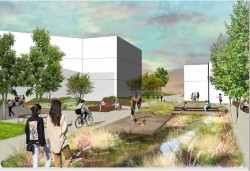Cambridge Innovation Parks Limited (CIP), BRE and 3PM have collaborated to manage an exciting challenge to the timber and offsite construction industry aimed at commercial projects.
CIP are in the process of creating one of the first fully sustainable business campuses in the UK, focusing not just on construction and operation but leading sustainable approaches such as carbon off-setting and wellbeing provision.
CIP have challenged the industry to help them build commercial office space using offsite manufactured timber units, unsatisfied with the feedback they have received about it being difficult to achieve and expensive and pushing the market to challenge this assumption.
Through this challenge CIP have heard from like-minded innovators who specialise in the production and provision of offsite timber. Interested companies completed pro-forma questionnaires that focused on the product solutions but equally on ethos, ethics and adoption of innovation as CIP want to build on their track record of fostering innovation and supporting innovators.
CIP see bio-based construction as an important path to their zero-carbon target. The offsite characteristic of the timber units is attractive for many reasons – modularity, scalability, adaptability and lifecycle duration. As activators CIP want to stimulate collaboration between forward-thinking companies in the construction industry: a priority for delivering these premium office spaces whilst positioning themselves at the forefront of adopting new processes.
Incoming tenants are actively encouraged to contribute to the sustainability of the campus through research and business activity. The CIP North site is targeted to be a zero-carbon site by 2030. This is in response to the International Panel on Climate Change Report published in October 2018 and ahead of the UK government policy which requires zero carbon economies by 2050. This includes incorporation of a range of sustainability standards on an integrated basis, including operational and embodied energy and carbon cost modelling, lifecycle assessments, use of bio-based, locally sourced materials and reviewing community impacts.
"I
would like to see cost parity between traditional carbon intensive
building systems and new innovative low impact systems to meet the
urgent zero carbon challenge," says Professor John French. Director of Development and Sustainability, CIP Fellow of Wolfson College, University of Cambridge. "Solutions need to be practical and scalable
and suitable for the commercial letting sector to adopt and in time to
address the climate emergency. This is an important challenge that we
are setting from the business and science park community and I look
forward to response from the sector."
The challenge received over twenty offers for solutions from UK and Europe-based companies. The responses and case studies provide were reviewed by eight members of the team separately before amalgamating conclusions and creating short lists. CIP put emphasis on adaption to be locally sourced, manufactured and erected in the UK if not now be inspired do so in the future. Aligned with carbon parity is cost parity and respondents needed to estimate costs. This tailored short listing process has resulted in five companies from big names to new starts that will be shortly be invited to interview with CIP and 3PM to explore possibilities for their solutions.
Interviews will be in February and CIP are looking forward to conversations with ECOsystems Technologies (Dingwall), Morgan Sindall (Cambridge), Natural Building Systems and Waugh Thistleton (Suffolk), Mills Power Architecture (London) and Innovare Systems (Coventry).
From March 2021 procurement of the CIP North campus will commence with the roll out of their strategic programme for this site. This will include the provision of three new buildings, associated car parking, cycle parking and landscaping. In addition to CIP North, CIP own land at two further sites - CIP South and West which are planned to be developed over the next few years and future developments will benefit from the relationships built during this process.
For more information visit: www.cambridgeinnovationparks.co.uk









